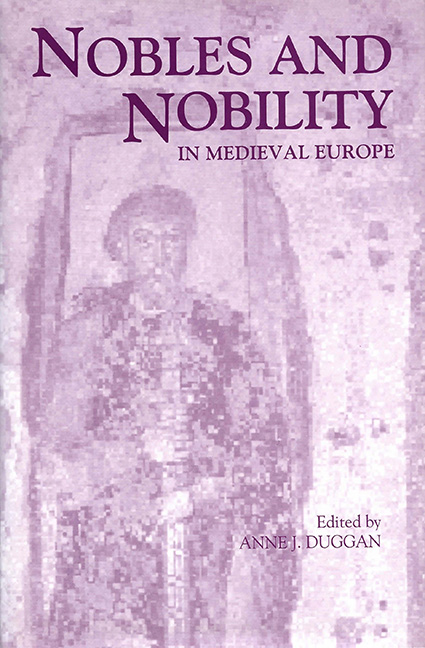 Nobles and Nobility in Medieval Europe
Nobles and Nobility in Medieval Europe Book contents
- Frontmatter
- Contents
- List of Illustrations
- Contributors
- Abbreviations
- Preface
- Dedication
- Introduction: Concepts, Origins, Transformations
- I Early Middle Ages
- II Central Middle Ages
- III Late Middle Ages
- 12 The Nobility of Medieval Portugal (XIth–XIVth Centuries)
- 13 Noblewomen, Family, and Identity in Later Medieval Europe
- 14 The Western Nobility in the Late Middle Ages: A Survey of the Historiography and some Prospects for New Research
- Index
13 - Noblewomen, Family, and Identity in Later Medieval Europe
from III - Late Middle Ages
Published online by Cambridge University Press: 25 October 2017
- Frontmatter
- Contents
- List of Illustrations
- Contributors
- Abbreviations
- Preface
- Dedication
- Introduction: Concepts, Origins, Transformations
- I Early Middle Ages
- II Central Middle Ages
- III Late Middle Ages
- 12 The Nobility of Medieval Portugal (XIth–XIVth Centuries)
- 13 Noblewomen, Family, and Identity in Later Medieval Europe
- 14 The Western Nobility in the Late Middle Ages: A Survey of the Historiography and some Prospects for New Research
- Index
Summary
In 1261, a parliament was held at Nikli, summoned by the baili of Morea in the aftermath of the Latin defeat at Pelagonia at the hands of the Byzantines two years earlier, when William de Villehardouin, prince of Achaia, was taken prisoner, and required to surrender three of his strongholds, Monemvasia, Mistra, and Maina. The parliament was attended largely by women, the wives of those who owed military service, although there were at least four men there as well. It was agreed to accept the terms laid down by the victorious Greeks, and the daughters of the marshal and constable were selected to go as hostages to Constantinople. This parliament was an extraordinary happening in the later medieval world, the usual pattern being for women summoned by right of tenure to send a male representative. At Nikli the husbands were necessarily absent because of death in or imprisonment after the battle, and, although the chronicle accounts only give men's speeches in the debate, the women had an important say in the final decision.
The whole episode raises important questions as to how women saw their identity in the medieval world. Did women, particularly of the higher nobility, see themselves as having a political role in later medieval Europe, and was this role inextricably linked with the position and circumstances of their families? Did the role change over time, and were there differences between the various parts of Europe as a result of law and custom, social ideas, and political decisions? In considering these questions, twentieth-century historians have to be mindful of a number of contradictory considerations which had to be faced by the medieval nobility. It was taken for granted that most noblewomen would be married, and, although the widow often enjoyed independence in her personal and business decisions, the presence of a husband was regarded as an invaluable support to a woman in safeguarding her property; when Margaret de Neuilly failed to secure her inheritance of Akova, she was advised by her friends to remarry, so that with the help of a powerful husband she would be able to secure her rights.
- Type
- Chapter
- Information
- Nobles and Nobility in Medieval EuropeConcepts, Origins, Transformations (King's College London 1998), pp. 245 - 262Publisher: Boydell & BrewerPrint publication year: 2000


